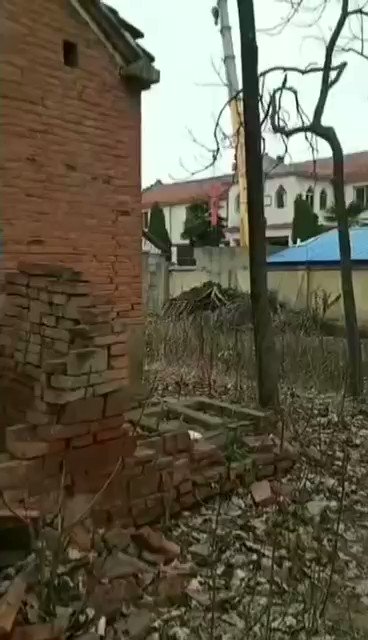In the midst of a pandemic partly of its own making and the lockdown that followed, the Chinese Communist Party reportedly still found time to persecute the nation’s minority Christian population.
In fact, according to Voice of the Martyrs, a non-profit humanitarian organization that tracks Christian persecution around the world, Chinese government officials used the COVID-19 crisis in order to better target Christians.
In one case earlier this month, authorities had a cross on a church in Guoyang County, Anhui province, removed with a crane, The Christian Post reported.
“A Christian with the surname Chen told persecution watchdog group China Aid that this church usually has 40 churchgoers attending its services, according to The Post. “Authorities used the lockdown as an opportunity to remove the church’s cross.”
Video also surfaced this month showing that Xiangbaishu Church in Yixing city, Jiangsu province, had been completely destroyed:
Religious persecution continues even in the midst of #WuhanVirus March 11 Xiangbaishu Church in Yixing city, Jiangsu province was destroyed by #CCP govt. Cross is our Glory大疫当前,江苏宜兴香柏树教会,于3.11日遭到强拆.举国上下深感人民的苦难,但谁知道在十字架上那位上帝之子的苦难?
397 people are talking about this
“Officials in Jiangsu province used the lockdown as an opportunity to demolish” the church, according to Fox News.
Even participating in online services can land Christians in trouble in Shandong province, where the practice has been completely outlawed.
“China is now holding itself up as a model for fighting the coronavirus,” Todd Nettleton, a spokesman for VOM, told Fox. “But fighting the pandemic hasn’t stopped communist officials from persecuting Christians.”
Perhaps one of the reasons the CCP is so concerned about Christianity is because it is one of the fastest-growing religions in China today.
According to experts, Chinese officials are worried that Christianity could pose a political threat.
“This isn’t really about religion,” Eva Pils, an expert on human rights at King’s College London, told The Guardian in 2015.
“It’s about loyalty and power.”
And that is perhaps what most, if not all, governments throughout history have cared about.
Right now, many people are scared.
Those affected by the current crisis find ourselves, regardless of race, creed or national boundary, threatened by the same inequity: an invisible pathogen — deadly to some — that strikes indiscriminately.
As such, we are reliant upon our governments to take action in order to fight it and protect their citizenry.
But at what point do reasonable measures become infringements on civil rights?
It’s a serious question that requires us to pay close attention to the responses of authorities not only right now, but especially once the danger has passed, because historically, governments do not like giving up newly obtained powers.
“It’s often the case that governmental power expands in time of emergency and doesn’t revert fully back to the status quo ante after the emergency has passed,” Richard Primus, a University of Michigan constitutional law scholar, told Public Radio International.
“Historically, the years of the Civil War, World War I, and World War II all saw important expansions of the federal government’s authority,” Primus said, “and those expansions in important parts remained after the wars were over.”
At this moment, the American government is expanding massively — much to the glee of big-government supporters — to try and cover the immense personal and financial damage being wrought across the country.
Over the past few weeks, Americans have been vigilant — we have worked together to isolate, self-quarantine and assist each other during this crisis.
But once it has passed, we should be just as vigilant against authoritarian calls to continue to curtail or strip away our rights.



